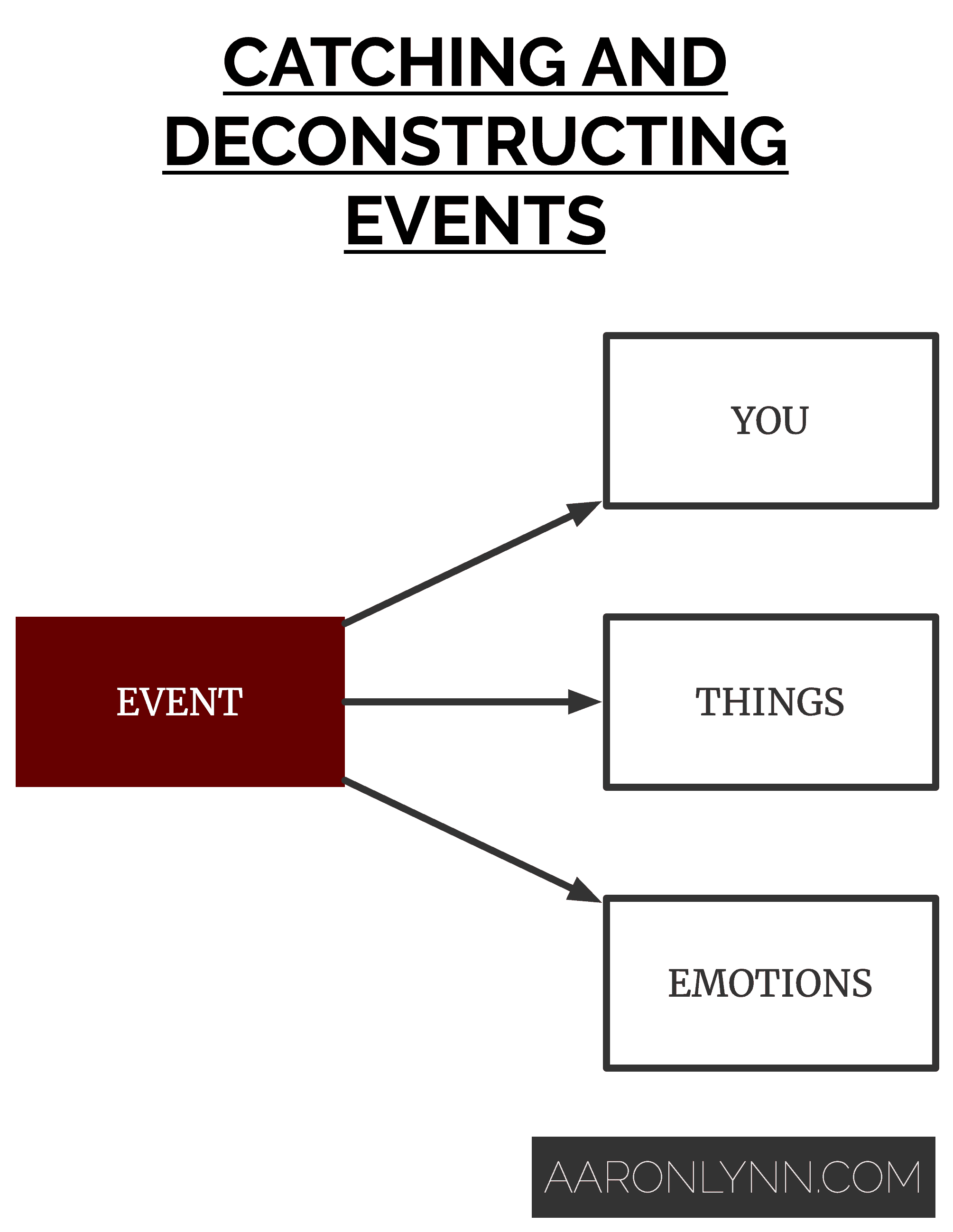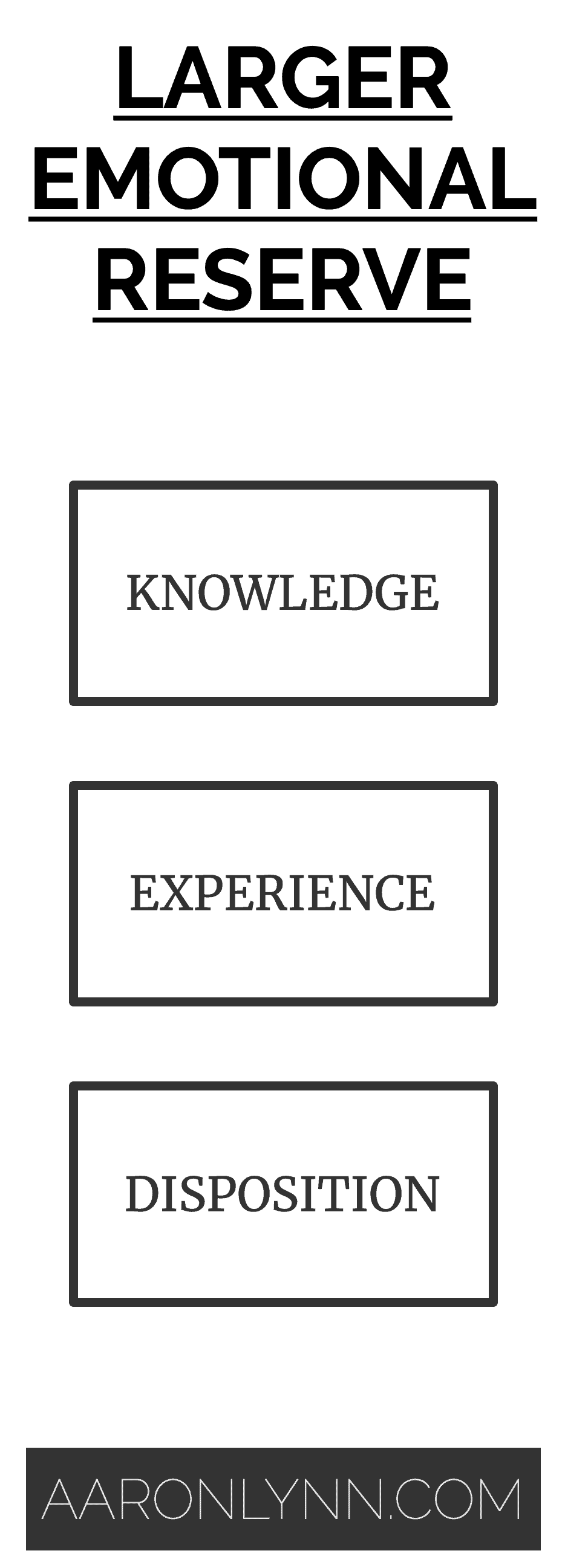
Ever have one of those days where it just seems like there’s a dark cloud hanging over everything you do?
You feel a bit stressed, a bit worried, a bit anxious.
Minor things in your everyday life remind you of bad things that have happened in the past, and how they weigh heavily on you.
Life is not all rainbows and unicorns, and sometimes bad things do happen to good people.
What makes a difference, is in how you handle it afterwards:
Do you become rock solid and develop emotional stability, reserve and resilience?
Or do you let it hold you back from the rest of your life?
Disclaimer: I am neither a therapist nor a licensed mental health professional. Please seek out professional advice and opinions.
Why You Need to Be Rock Solid

Getting a handle on your worries and negative emotions is important. Becoming “rock solid” with your emotions is important.
Serious question: Who doesn’t want to make their life a little more tolerable (and perhaps even enjoyable) before passing into the next one?
If you don’t handle your worries, anxieties and stress, they find ways to express themselves in your life… and often in really strange ways.
You end up with bad inner game and negative mindsets.
You end up with repressed thoughts and disproportionate outbursts, because you don’t have a steam-release system to manage things.
You never truly become an actualised human being, and never reach your potential.
Minor stress and worries and emotional wear-and-tear festers, and can manifest as maladaptive disorders like narcissism and codependence.
You become susceptible to drama and flights of fancy.
If you have children, you end up passing down these problems to them. And chances are, they won’t be able to resolve them, and the cycle continues with each generation.
It also turns out that trauma and negative experiences create negative health outcomes. Like heart disease. And lower life expectancy.1Centers for Disease Control and Prevention, U.S. Department of Health & Human Services (2000). About the CDC-Kaiser ACE Study. https://www.cdc.gov/violenceprevention/acestudy/about.html
But if you learn to handle these things and become rock solid — if you learn to build emotional stability and emotional reserve, and to systematically overcome your anxieties, worries and stress — then you can build confidence and initiative, and this leads to having a life full of the things you want to have and want to do.
Let’s look at a number of different ways to become rock solid.
1. Emotional Stability as a Skill

The first way is to become rock solid, is to treat it as a skill. And this is called developing emotional stability.
I would consider this an advanced soft or social skill.
Being rock solid is like being an oak tree.
You stand strong against everything nature throws at you — the wind, the rain, the storms, and hopefully the lightning.
You just weather it all, standing tall, resolute and perhaps even defiant.
Bits of bark and twigs and leaves may fall away from time to time, but your core remains strong and you remain stable.
The skillset of emotional stability begins with that metaphor and extends into rational thinking. The more that we can look at situations rationally and see them for what they truly are, the less of an impact they will have on our emotions.
There are specific processes that can help with this — here is one that I learned from studying family systems.
You take something that has happened in your life, and you deconstruct it into its component pieces:
- You.
- The things that happened (events/actions taken).
- The emotions.
You can then take each of these components and break them down even further. It could be the various parts that add up to your sense of self, the structure of the emotion experienced or the sequence of events or actions taken.
This is similar to the Stoic concept of seeing things for what they truly are.2For example, the Stoics saw sex as nothing more than friction, convulsion and then some cloudy liquid.
By doing this, we create a greater distance between what has happened and how we feel about it. We blunt both the emotional highs and lows with the intention to handle them better.
Obviously not all emotions are bad. It may take some practice, but over time we can learn to catch and deconstruct only the negative experiences, and continue to enjoy the positive ones.
2. Creating a Larger Emotional Reserve

The second approach to becoming rock solid is to look at your emotions as a resource and to develop an emotional reserve or capacity.
This is the idea that we can typically only experience one emotion at a time, or a set of related emotions in rapid succession.
Given this limitation, wouldn’t it be better to use up our emotional reserve to experience only good emotions?
The way to do this is with a simple model:
Knowledge is what you know about something, and gives you reasons to “rationalise” and explain the things that happen to you. It also gives you the beliefs you need to be more resilient and have a greater emotional reserve.
Experience is the recognition that as we see more things in lives, they tend to bother us less.
Disposition is our inclination towards something that happens. We’ll explore this more in the next section.
Building a larger emotional reserve is done by increasing all of these things. More knowledge and more awareness of our emotions and the things that happen to us. More experience in life. And a healthier disposition towards the things that do happen.
3. Borrow From Stoicism

The third approach to becoming rock solid is to get philosophical and borrow from Stoicism.
Why Stoicism?
Because it is a philosophy that recognises that life is hard, and should be less about avoiding the hard things, and more about being able to handle the hard things.
It also has a core aim of tranquility or inner peace — some form of happiness on this plane of existence.3The value of tranquility is obvious in-and-of-itself.
One of the Stoic practices is the notion of control. It recognises that for everything that happens:
- If you can do something about it, do it.
- If you can’t do something about it, there is no point in stressing as you can’t do anything anyway.
- In the end, either the thing will end or you will die. Either way, it ends.
Stoicism recognises that you can’t always control or avoid the bad things that happen, but you can choose how you react to them.
If you recognise the same and practice the Stoic notion of control, this helps you build emotional reserve and capacity.
4. Handling Everyday Anxieties, Worries and Stress

The fourth thing you can do to become rock solid is to use a systematic approach to handle your everyday worries, stress and anxieties.
I am talking about the low-level background hum that gnaws away at you and makes everything a little bit more greyed out, not the larger traumas (we’ll get to them next).
Here are the four things you can do to address the everyday wear-and-tear.
4.1. Limit your exposure to triggers
The biggest trigger for stress, anxiety and worry is usually other people.
It could be bad friends. It could be family.
Whoever it is, no matter how you are related or how close they are as friends, if they are stressing you out constantly they need to go.
“Fade to black” on them. Block them on your messaging apps. Move city if you need to.
In the words of Dan Kennedy:
If you’re keeping me up at night for more than three nights in a row and we aren’t sleeping together… you need to go.
For all other triggers, work out what they are and then get rid of them. They’ll usually be something behavioural or environmental.
4.2. Use systems to handle the anxiety, stress and worries
One of the things that I love about automated systems like machines and code, is that they don’t stress. They don’t worry. They don’t feel anxiety.
So if you have something that you do that triggers a stress reaction in you that can be done by a program or script… let the program or script do it. Most of this will be work stuff.
Now if you have something that can’t be automated, then find a way to delegate or outsource it.
As much as it is hard to believe, some people out there actually absolutely LOVE what you HATE doing.
Most people I know hate digging down into details and deconstructing the nitty-gritty aspects of systems — but I personally love it.
Most people I know hate balancing debits and credits and working out cashflows — but I’ve met my share of accountants who absolutely love it.
For everything else that can’t be automated or delegated, fall back on more manual systems. Let the various parts of something like the time management stack take on the stress and worries for you. Set up your systems properly and then trust them to keep you organised and focused.
4.3. Work out the cost and then pay it
Another way to remove the triggers of everyday worries from your life is to ask: How much would it cost me to make this go away?
Then pay that cost and move on with your life.
Here’s a very real example:
If there’s an argument about money, let the other person “win a bit” and move on with your life.
Money can always be made back. But your sanity, wellbeing and time cannot.
And yes, you will “lose a bit” to make the situation go away. But if you zoom out from the situation to the grander scheme of your life and everything else that will happen in it, you’ll probably find that this is acceptable.
4.4. Just forget about it
If you come across a trigger that can’t be removed, systemised away or paid to go away, then just leave it alone from now.
This is for everyday worries that are really not that big of a deal.
Just tell yourself “I’ll deal with it later” and let the emotions pass. Chances are, you’ll forget all about it and the situation will resolve itself.
5. Handling Serious Anxieties, Worries and Stress

In contrast to the everyday worries we just discussed, serious anxieties, worries and stress are the things that have deep root causes and will not just go away on their own. They need to be handled with process.
Note: Everything in this section falls under “therapy” and I would strongly advise seeking out professional help.
Root causes are traumatic events or incidents that have happened in your life that have resulted in trauma, and are the beginnings of the negative emotions you deal with now.
The oversimplified rule for root causes is this:
Someone fucked up your childhood.
It is usually family. Maybe your siblings or relatives. But probably your parents. And in some cases, friends, teachers or authority figures.
Whatever it is, this root cause goes on to create trauma and colours everything you do in your life from that point forward. And it manifests as serious worry, crippling anxiety and unmanageable stress.
Here are some process-oriented things that we can do.
5.1. Seek professional help/therapy
I’m saying this again: The best way to handle serious anxiety, worries or stress is to seek professional help through therapy.
You can ask trusted friends for referrals. You can go online to search.
You should try to find someone who works with a model and style that you like. There are many different models of therapy and you need to find one that actually helps you.
There is a certain stigma attached to seeking professional help for stuff “in your head”, especially in certain countries and cultures.
If that’s the case where you are, then be discreet about it, and politely tell other people to sod off if they can’t mind their own business.
This is your life that we’re talking about and you only get to experience it once — so why let the uninformed opinions of others stop you?
5.2. Decompartmentalisation, aka kick it down the road
Decompartmentalisation is the recognition that you may not have the emotional bandwidth to handle a serious issue right now… and deciding to lock it up and to handle it later.
I’m pretty sure most therapists would not recommend this, but it can work.
Kick it down the road, and handle it when you’re better equipped.
5.3. Deconstruction
Deconstruction is the process of applying systematic problem-solving to the stress, worry or anxiety you are feeling.
Take what you perceive as the problem, and slice, dice and deconstruct it every way you can.
If it’s a big problem, break it down into smaller problems and handle those individually so you don’t get overwhelmed.
If it’s a complex problem, find a model that you can use to see things from a different perspective and handle each part of the model one at a time.
As an example, we talked about the catching and deconstructing events model earlier in this guide, and I have written about a number of models before like the areas of life model.
5.4. The DIY therapy alternative
If you really don’t want to go the therapy route and want to “do it yourself”, you can.
(But seriously, consider seeking professional help first.)
To do this you need an extremely high level of awareness around the problem that you have and its root cause. You also need the self-discipline to see this through to the end.
What you do is this.
Go to a bookstore or Amazon, and find three-to-four books on the problem that you have.
Cross-reference the reviews on Amazon with those on GoodReads and find the three-to-four books that seem the most applicable to your situation.
And then read them. And take notes, including action items.
And then actually do those action items.
These books will give you the models and knowledge with which you can deconstruct your problems, but they are just ideas until you put them into practice.
This is not an easy process. Having been through it myself, I will tell you that for a serious cause of anxiety, stress or worry, it will take you at least six months to really see any progress.
If you’re up for the challenge — then game on!
If not, working with a professional is again, a great alternative.
The key with these process-oriented approaches to becoming rock solid is to not get stuck in the perfection trap.
Some people believe that they can’t move forward in their life until all their past trauma has been resolved.
For example, they can’t start an exercise programme because their childhood experiences resulted in low levels of self-discipline. Or they can’t leave their abusive partners because they haven’t found someone new and they don’t feel loveable yet.
There is some truth to these beliefs, but there is also an element of excuses.
Sometimes it is better to just have some quiet optimism and fortitude — and do the best you can and carry on.
Life is never going to be one-hundred percent perfect but that’s just the human condition. We all have our baggage and demons and we learn to live with them, and sometimes even harness them for our own good.
6. The Endgame of Being Rock Solid

The endgame for being rock solid is to have emotional stability and a large emotional reserve.
To be more resilient and to carry yourself with quiet optimism. To be happier in your own life and to have a larger capacity with which to serve others.
As long as you are self-aware, you get better at handling the everyday worries, stress and anxiety as you get older.4I know that sounds like a cop-out, but it’s true.
If the hard things and problems you experience were passed down to you from your family, then part of the endgame is to break the cycle and to do better — to not pass it down to your own children and to actually make progress for a change.
By doing all these things you can live a better life where you can do the things that you want and have the things that you want.
What To Do Next
There are five different approaches in this guide for becoming rock solid.
Try one of them. Or all of them.
All of us are different in our own ways and you need to work out the best for you.
For some insight into how I handle this for myself, you can download my manifesto Evolution. It’s a quick read and 100% free. Grab it here.
- Centers for Disease Control and Prevention, U.S. Department of Health & Human Services (2000). About the CDC-Kaiser ACE Study. https://www.cdc.gov/violenceprevention/acestudy/about.html
- For example, the Stoics saw sex as nothing more than friction, convulsion and then some cloudy liquid.
- The value of tranquility is obvious in-and-of-itself.
- I know that sounds like a cop-out, but it’s true.
Photos by Jeremy Bishop, Alfred Leung, Aziz Acharki, Thomas Kelley, Bradley Weber, Randa Abdul, Toa Heftiba.

